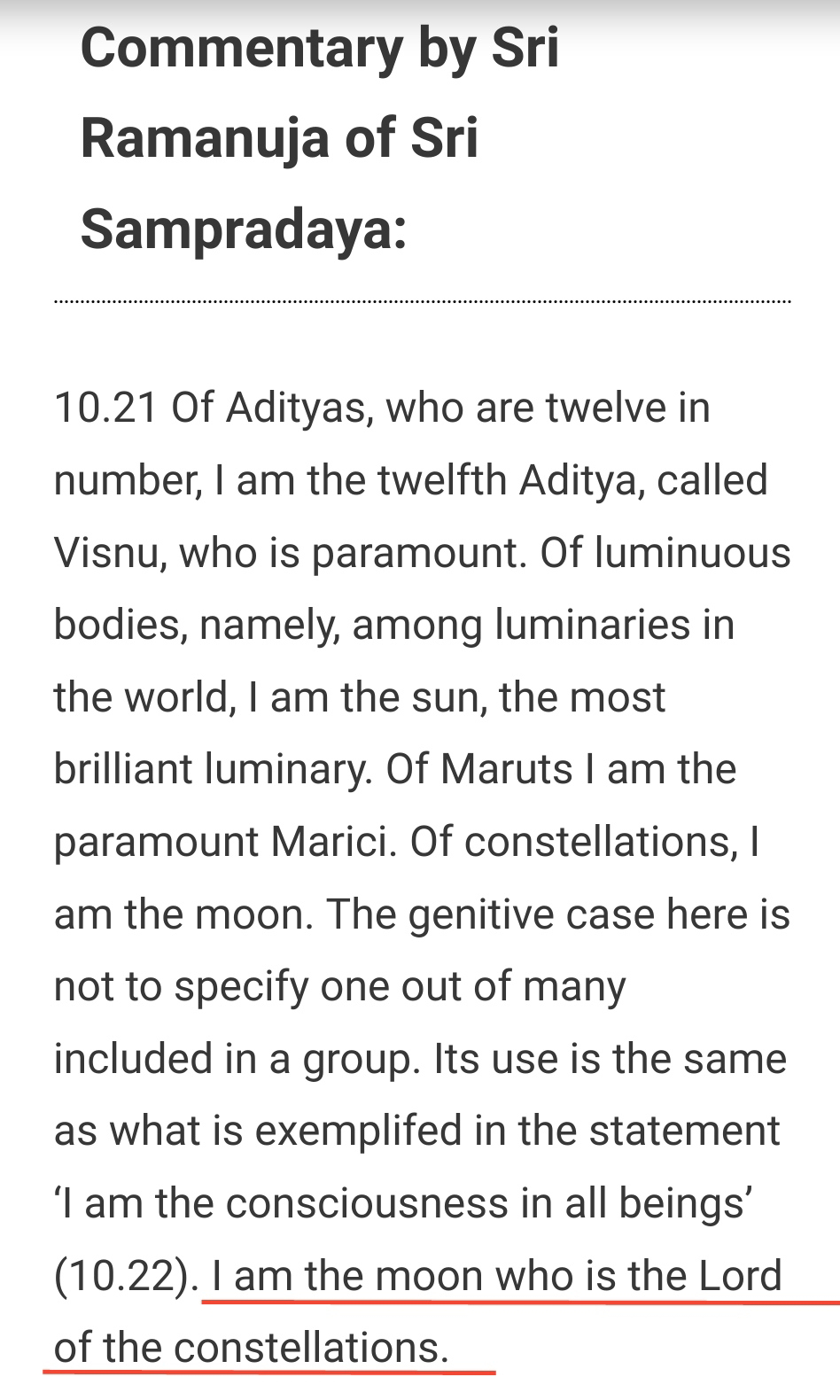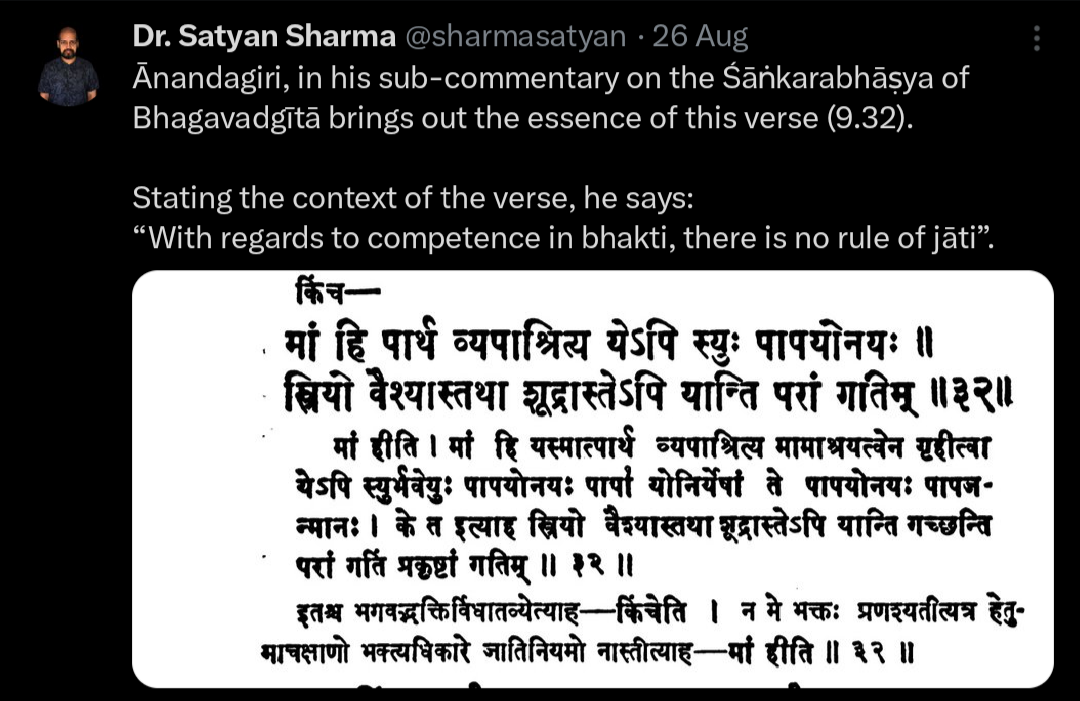Bhagavad Gita( Rebuttal of all criticism)
There are many Anti-hindu sites throughout internet which criticize Bhagavad Gita on various things, I collected there claims along with their alleged references. Let's analyse:-
Claim 1:- Scientific errors in Gita:-
i) Gita 10: 31, “Of purifiers, I am the wind; Rama of the warriors I; and I am Makara (crocodile) of fishes; of streams, Ganga I am.”
Crocodile is not a fish it is a reptile
ii) Gita 10:21 “Of Adityas, I am Vishnu, of lights I am the radiant sun, of the Maruts, I am Marici, and among the stars, I am moon.”
Moon is not any star

Adi Shankaracharya's Gita Bhasya English translation:-
Adi Shankaracharya's Gita Bhasya Hindi Translation:- *Note:- Here it says fishes like aquatic creatures I am Makara.
*Note:- Here it says fishes like aquatic creatures I am Makara.










iii) Gita 4:1, “I have given this infinite knowledge to Sun, he taught it to his son Manu (one of the ancestors of the mankind) and he taught it to his son Ikshwaka (one of famous saints)”
Sun is a non-living entity how come Krishna gave this knowledge to the sun ?
Here in this verse also said Sun have a son name Manu
iv) Gita 3.14 From food arise all beings; from rain food is produced; from sacrifice comes rain; and sacrifice is achieved through activity.
From sacrifice(yajna) produced rain, this is an superstition. Rain is a natural processes it is not comes from Yajna. There are many places where yajnas are not being performed or have never been performed still rains there.
Rebuttal:-
The first claim is bogus here is the verse see what actually it says
Translation by various scholars:-
Swami Sivananda's translation:-
Adi Shankaracharya's Gita Bhasya English translation:-
Adi Shankaracharya's Gita Bhasya Hindi Translation:-
So it simply means fishes like aquatic creatures and not among fishes I am Makara.
Even lets see what is Makara itself mean as per Sanskrit Dictionary:-
So technically the word is itself not limited to crocodile alone, it was used for shark and other aquatic creatures as well.
Next one the actual verse is :-
आदित्यानामहं विष्णुर्ज्योतिषां रविरंशुमान् |
मरीचिर्मरुतामस्मि नक्षत्राणामहं शशी ||
*Note here the actual word is Nakshatra. The term used for lunar mansion in Hindu astrology.
That's why in other translations the word used asterism insted of stars.
Ramanujancharya in his Commentary explained this verse :-
Commentary by Sri Sridhara Swami of Rudra Sampradaya nicely explained why moon:-
The next claim is regarding Gita 4.1 where it stated Lord Krishna gave this knowledge of Gita at first Sun, later from his son Manu got it from him and so on.
The foremost mistake is that here Lord Krishna talks about Sun god Vivasvan who is the abhimani devata of the Sun not the material Sun which we see through our naked eyes
Here is the actual verse:-
इमं विवस्वते योगं प्रोक्तवानहमव्ययम् |
विवस्वान्मनवे प्राह मनुरिक्ष्वाकवेऽब्रवीत् ||
The other claim is from sacrifice(Yajna) comes rains in Gita 3.14 At first let's see what exactly that verse mean, Here is Vidyabhushana's commentary on that verse:-
These verses are not talking about specific Yagnas which have rain as a fruit. They are talking about the general function that Yagnas serve in providing rain to the Universe and not someone literally performed Yajna for rain. As you see the above excerpt there Vidyabhushana even quote Manusmriti 3.76, let's see Medhatithi's commentary on that verse of Manu for further clarification:-
Claim 2:- Killing people in the name of God just like Jihad
Gita 18.17 :- "Those who are free from the ego of being the doer, and whose intellect is unattached, though they may slay living beings, they neither kill nor are they bound by actions."
Rebuttal:- the verse is "He who is free from egotistic notion. whose mind is not tainted,-though he kills these creatures, he kills not, he is not bound."
This line alone break this whole imaginary connection with jihad, Jihad is a war against enemies of Islam, even one who does not believe in Allah and his messenger automatically becomes enemy, this is simply killing people for your own sake in the name of God and Religion.
A soldier kills enemies to protect country in that case the killing is not for his own sake, even he is under the orders of the Government, similarly Lord is the ruler of this universe we have to do our prescribed works without any selfish motives.
Claim-3:- supporting birth based caste system
BG 18.41:- The duties of the Brahmins, Kshatriyas, Vaishyas, and Shudras—are distributed according to their qualities, in accordance with their guṇas
Ramanujancharya commentary:-
Rebuttal :- Here's nothing wrong varna is birth-based from other scriptures as well. Even Buddhism & Jainism also have the same concept. What's the problem in Birth Based varna system?
The thing is respect & character is the main thing for earning respect as per Hindu texts even Sri Krsna himself confirms this in Uddhava-gita:-
I, who am the Supreme Immanent Self (Paramatma) and the most beloved of all (priya), am attainable for those established in truth (satam) only through unalloyed devotion undertaken with full faith.
Moreover, bhakti performed with exclusive fixity upon Me purifies even the outcaste dog-eaters, (SrimadBhagavatam 11.14.21)
[Lord Brahmā said]:- If one is born in a family of brāhmaṇas who are absorbed in hearing divine sound, but has bad character and behaviour, he is not worshipable as a brāhmaṇa. On the other hand, Vyāsa and Vaibhāṇḍaka Muni were born in unclean circumstances, but they are worshipable. In the same way, Viśvamitra Muni was born a kṣatriya, but he became equal to me by his qualities and activities. Vasiṣṭha was born as a son of a prostitute. Many other great souls who manifested the qualities of first-class brāhmaṇas also took birth in similar humble circumstances, but they are also called perfect. The place where one takes birth is of no importance in determining whether one is a brāhmaṇa. Those who have the qualities of brāhmaṇas are recognized everywhere as brāhmaṇas, and those who have such qualities are worshipable by everyone. (Padma Purāṇa, Sṇñṭhi-Khaṇḍa 43.321,322 Gautamīya-saṃskaraṇa)
Hence respect is the main thing doesn't matter if varna is birth based.
Point to be noted:- person born in a lower varṇa who exhibits the qualities of a higher varṇa should be given respect due to the his qualities but not take the Dharma of higher varnas like Vedic sandhyā-vandana, etc. However after initiated in Tantrik system they could do tantrik Sandhya Vandana and other Tantrik kriyas.
Claim-4:- Supporting Brahminism
Bhagvada Gita 17.20:- Charity given to a worthy person simply because it is right to give, without consideration of anything in return, at the proper time and in the proper place, is stated to be in the mode of goodness.
It mentions that charity should given to those who are Worthy.
And Who is worthy?
Answer : Vaishnava Brahmins according to Traditional Vaishnava Commentaries
Rebuttal:- The actual verse simply said Worthy person..... peoples have problem with Traditional Commentators because they include Brahmins. Question is why Brahmins?
Baladev Vidyabhushana explained:- "....it should be given to a recipient such as brahmana who can protect the giver with his knowledge and austerity."
Garuda Purana1.98.3 A gift should never be taken by a person devoid of learning and austerity. By taking it he degrades the giver as well as himself.
Manusmriti & other Smritis too clarified that, gift should be given only a learned & austere brahmin :-
In Vaishnava pancharatra text Parama Samhita chapter 12 says about Daan(gift):-
"45. Gift of food is the best form of charity; as also the giving of money in all ways, as well as the giving, of bedding and seats to devotees of Viṣṇu and ascetics. The gift of knowledge (vidyā) is the highest; other gifts however large are not as good.
46. The gift of land, mounts, vehicles, houses and other wealth, bring one great fame; but, are middling in respect of real merit.
47. Gifts made on occasions of suffering, from interest that a fit recipient presents himself on particularly propitious occasions, or because of access of wealth, each of these brings its own merit which is regarded as of many kinds.
48-49. Whatever is done with a view to securing mere fame, or praise, or for being talked about, meets with the disapprobation of the good—the more so, in the case of a devotee of Viṣṇu. The gift of lands, etc., is commendable, if the motives are other than these, such as length of life, health, children, etc., in order. Examine beforehand the things to be gifted, the time and place, and the worthiness of the donees as well."
Claim 5:-
In Gita 9.32 "Those who take refuge in Me though they be of lower birth – women, vaiśyas and śūdras can attain the supreme destination"
1. Adi Shankaracharya of Advaita Vedanta:-
"Lower birth means those who are born because of sins. Who are they? They are women, vaishyas and Shudras."
पापयोनयः पापा योनिः येषां ते पापयोनयः पापजन्मानः । के ने इति आह स्त्रियो वैश्या तथा शूद्राः
He interprets that Women are inferior because they aren't allowed to ko vedas, Vaishyas who are engaged in agriculture, Shudras because they don't have any right to education owning to their birth.
3. Abhinavgupta of kashmiri Shaivism commentary on Gita:-
He interprets that Women are included amongst list of Low birth because they are ignorant. Vaishyas are included because they are engaged in agriculture, shudras because they are not allowed to take part in vedic rituals
4. Dhanpati suri's commentary on Gita (Bhashyotkarsh Deepika):
Who are Lower/sinful birth? के ते पापयोनय
They are women, Shudras and Vaishya इत्यत आह- स्त्रियो वैश्यास्तथा शूद्रा इति
5. Sridhar Swami followed same interpretation
"Women, Shudras are included because they are devoid of studies (vedic)"
स्त्रियः शूद्रादयश्वाध्ययनादिरहिताः
Rebuttal:- There's actually no problem in that verse it actually states whoever wherever born doesn't matter if they surrender unto me they will attain me. But peoples making issue with the adjective Papa-yoni. Critics cherry pick things according to their convenience. Let's clear first the interpretation by Adi Shankaracharya where he put women, vaisya & women under papa-yonah in his commentary. This interpretation of Adi Shankaracharya was clarified by Anandagiri(~12th century CE) in his sub- commentary of Shankaracharya:-
Different Traditional Acharyas interpret that word "Papa-yonah" differently for example Pushtimarg Vaishnava Sampradaya and Gaudiya sampradaya interpreted Papa yonah as a seperate category other than women, Shudras, & Vaishyas....and under that category comes mlecchas and other barbaric tribes. In short Lord wants to say even mlecchas and other barbaric tribes will be free and can attain lord through devotion. Here are such traditional commentaries:-
For all the above commentaries credit:- @reckoning ignorance
Hence from the above statements the conclusion is that regarding the papa-yonah traditional scholars have different opinions....But all are clear about the message that wherever someone born, it doesn't matter, if he/she surrender to the lotus feet of Lord he/she will attain Lord.


















Comments
Post a Comment